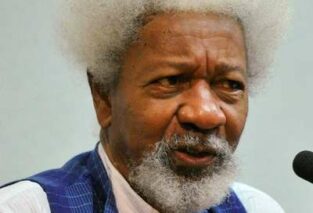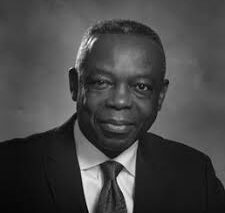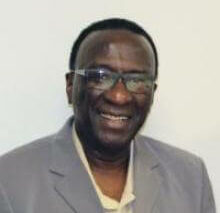In Part 4 of his interview to Cameroon Life Magazine, Celestin Monga denies that he is nursing any political ambitions and dismisses the idea that Paul Biya is an intellectual. He also takes delight in flinging punches at other so-called intellectuals, who enjoy the favours of the ruling prince. Read on.
Mr. Monga, let’s talk about France and Cameroon. Rumours are making the rounds of certain circles that the upsurge in popularity in Cameroon of a party like the SDF is giving the French sleepless nights. The French, it is said, abhor the idea of ever seeing an Anglophone rule this country and, as a compromise, they are said to be eyeing you seriously for the Presidency, at least, in the interim period. Do I have the honour to be talking to the future President of this country?
(Burst of laughter) Are you joking? I thought you came here for an interview, not for a joke! No, let’s be serious. I never pay any attention to rumours. I’m a banker not a politician. But, about France’s attitude towards Cameroon, I believe that we really shouldn’t think each time we want to do something for ourselves, or for our people, about what France, or America, Britain or Germany are going to think. We cannot always worry about them when we want to fight for the freedom of our people and country. I strongly believe that we have to fight tooth and nail to liberate our country from the Biya regime and to change the minds of our people and give them prospects of a better future. That to me is the only struggle that really matters. What the French think in Paris doesn’t interest me. I know they have the money, technology, and the weapons but I believe that if Cameroonians were to decide that Mr. X or Mr. Y should be in power in this country, no external power, no matter how powerful, would change that.
I hate to hear opposition leaders in this country always talking about France, America, Britain, etc., and shivering at what they may think or not think about them. I believe that those countries support Biya not so much because they care for him but because he defends their personal interests; that’s all. If someone can come up today who can rule this country better than Mr. Biya, I’m sure he’ll get the backing of the Cameroonian people and that’s all that matters, as far as I’m concerned.
Have you never personally nurtured any political ambitions?
What kind of political ambitions do you want me to have? I’m a banker, that’s all.
Given your popularity among opposition circles in this country, a political party could one day decide to give you a lead position in its structure.
It’s not because you’re popular that you can necessarily rule the people. My friend, Lapiro was much more popular than I am but where is he today?
Good question, where is he today? Do you still consider him as one of your friends?
I don’t know where he is today. Of course, I still consider him one of my friends and I’ll still like to maintain our friendship. To me, friends are for life, irrespective of our political differences. I don’t like to judge people by their political opinion alone. That’s not really important; friendship should be for ever.
You were invited to the recent SDF Convention in Bamenda where you received a standing ovation after your recent interview with Messi Messi. What was your impression of that convention?
The SDF Convention was a total success. I was very impressed by the quality of the organization. That party is, indisputably, the most important political force in our country today.
Are you one of its militants?
No, I’m not a member of any political party. I believe in keeping my distance from political parties so my critical views will not be tainted.
Now, let’s talk about your writings. I understand you’ve formed a sort of writers’ club.
No, it’s not a writers’ club as such; it’s rather a research group called GERDES: Groupe d’Etudes et de Recherches sur la Démocratie, l’Economique et le Social, chaired by Professor Fabien Eboussi Boulaga of the University of Yaoundé. Among the founding members you have people like Daniel Etounga-Manguelle, Achille Mbembe, Ombe Ndzana and Professor Ambroise Kom.
Who can apply for membership in your study group?
Any intellectual, irrespective of political affiliations, is welcome to join. We have members from all parties in our midst. No problem there.
Would you admit Biya if he were to apply for membership?
C’mon, let’s be serious! He’s not an intellectual!
But he’s apparently written a book, Communal Liberalism, propounding his political philosophy. Have you read it?
Of course, I have; but it’s full of empty slogans, nothing else. It contains no political programme whatsoever.
Now, what about Mono Ndzana? Would you admit him in your group?
(Undisguised contempt) Who’s that, for goodness sake? Some old Korean philosopher or a Cameroonian? No, let’s be serious.
Would Mendo Ze qualify? He seems to have published a few things here and there?
I don’t give a damn about the embezzlers of this nation.
Let’s turn to the press in Cameroon. Are you familiar with the Anglophone press?
Yes, I try to read all the newspapers published in Cameroon.
I must admit that I was surprised when you mentioned on the phone that you were familiar with Cameroon Life and that you read it on the regular basis.
Oh, yes; it’s very well known. We don’t have many of such magazines here in Cameroon.
Censorship seems to have retuned to Cameroon in full force. You can hardly pick up a newspaper these days without seeing blank pages in it.
That’s true. The last issue of Le Messager was seized. The main problem about censorship is that the Cameroonian authorities don’t respect their own laws. The 1990 law on social communication says that no one is obliged to present the brush proof of their newspaper to the censor before publication. But the Governor of the Littoral Province has unilaterally decided to oblige all the papers to be censored prior to publication. So, when you have a government that cannot obey its own laws, what good thing can you expect from it?


